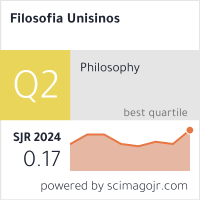Parmenides’ first and second hypotheses, auta ta homoia, and Socrates’ astonishment
DOI:
https://doi.org/10.4013/fsu.2020.212.05Resumen
In this paper, I propose a new interpretation for two of the most debated passages of Plato’s Parmenides: Socrates’ long speech (128e5–130a2) and Parmenides’ first antinomy (137c-155e). My aim is to demonstrate: 1) that Socrates’ speech can only make sense if we understand auta ta homoia as a third kind of entity, the immanent property sensibles have by participating in the form of Likeness; 2) that the first two hypothesis of the second part of the dialogue (137c-155e), together with Parmenides’ criticism in the first part of the dialogue (130b-134e), is an answer to Socrates’ challenge (128e-130a). Parmenides’ arguments aim to show that, according to Socrates’ own premises, it is not possible for forms or immanent properties to be the kind of unity Socrates wants them to be. Finally, 3) I will use these results to suggest an innovative answer to the vexed question about the relation between the first and second parts of the Parmenides. According to my interpretation, the exercise of the second part of the dialogue does not provide the solution to Parmenides’ criticism of the theory of forms, despite what the majority think today. Rather, it radicalizes this criticism by pointing to a fundamental miscomprehension on Socrates’ conception of what it is to be a unity.
Keywords: Plato, Parmenides, unity, ontology, forms.
Descargas
Descargas
Publicado
Cómo citar
Número
Sección
Licencia
Concedo a revista Filosofia Unisinos – Unisinos Journal of Philosophy o direito de primeira publicação da versão revisada do meu artigo, licenciado sob a Licença Creative Commons Attribution 4.0 (que permite o compartilhamento do trabalho com reconhecimento da autoria e publicação inicial nesta revista).
Afirmo ainda que meu artigo não está sendo submetido a outra publicação e não foi publicado na íntegra em outro periódico e assumo total responsabilidade por sua originalidade, podendo incidir sobre mim eventuais encargos decorrentes de reivindicação, por parte de terceiros, em relação à autoria do mesmo.










